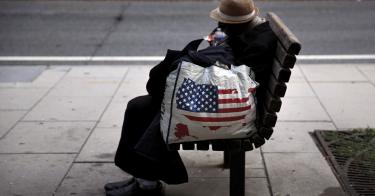For all the obsession in Washington and in college faculty lounges over income inequality, why isn't there more outrage over government policies that exacerbate the problem? There are hundreds of programs that make the poor, poorer and increase poverty in America. Many of them were exposed last week by my colleagues at the Heritage Foundation forum on this very topic.
Economist Don Boudreaux of George Mason University unmasked two such policies. One is trade protectionism. Trade barriers raise prices and "act as a regressive tax" on Americans, Boudreaux explains. They also stunt the very innovation process that makes goods and services widely available to people at affordable prices to begin with. Think about who the consumers are that shop for those everyday low prices at Walmart. It's not Hillary Clinton.
Minimum wage clearly fits into this category as well. In every other industry, Boudreaux notes, when something is more expensive we buy less of it. Why do some economists think that isn't so when it comes to buying labor.
Especially for the young and the lowest skilled, minimum wage becomes a toll that prevents many from entering the work force and gaining the skills that can make a low income or middle class worker a high income worker. This is so obvious that one wonders why liberals keep championing the minimum wage cause.
Marlo Lewis of the Competitive Enterprise Institute points out that the fuel economy standards promoted by the leftist environmentalists add thousands of dollars to the cost of a new car. He estimates that these "green" policies could mean that 5 million fewer Americans each year can't afford a new car. And, again, those 5 million victims are surely not people like AL Gore or the board members of the Sierra Club.
Another green policy that hurts the poor is the anti-fracking crusade of the environmentalists. In my book with Kathleen Hartnett White, "Fueling Freedom," we point out that the lower cost of electricity due to cheap shale natural gas has benefited low income households to the tune of well over $4 billion a year.
This is four times the benefit of the low income home energy assistance program. So if liberals really care about the poor, why not get rid of LIHEAP and promote fracking instead?
Social Security is the greatest swindle of the poor ever. A new study by Peter Ferrara for the Committee to Unleash Prosperity shows that the average poor person who works 40 hours a week during his or her working life would retire with a larger monthly benefit and would have $1 million or more in an estate that could be left to a spouse or children at death if they could simply put their payroll tax dollars into a personal 401k retirement account and tap into the power of compound interest.
Under Social Security poor (and middle class) households leave next to nothing for their kids at death. So Social Security robs nearly every low and middle income family with a full time worker of at least $1 million over their lifetime. What a deal!
Occupational licensing laws — in trades like moving companies, realtors, hair dressers, limousine services, beauticians, physical therapy and on and on — stunt small business start ups, destroy jobs, and raise prices for lower income consumers. What about the right to make a living?
Big government advocates defend these statist occupational barriers to entry by arguing that they are needed to uphold progessional service quality. Professor Boudreaux shows evidence that to the contrary, licensing requirements reduce service quality by shrinking competition in the industry.
Arguably the program that has set back upward income mobility for the poor the most is the government school system in inner cities. Every study finds abysmal educational outcomes and even unsafe environments for school children despite cities spending upward of $20,000 per child. In Catholic inner-city schools, these same kids could and should be receiving a better education at half the cost.
Yet liberals who champion the poor oppose school choice programs that would raise educational achievement and future earnings. (Look at the disgraceful treatment of Trump's education chief Betsy Devos).
These examples merely scratch the surface of scores of governmental polices that are regressive. Could it be that the gridlock and polarization in Washington could be ended by a bipartisan reform movement to scout out and remove laws and rules that hurt those at the bottom of the income scale the most?
One universal goal that we should all agree on and aspire to is equality of opportunity — which these laws squelch.
Where are Bernie Sanders and Elizabeth Warren and Nancy Pelosi and the class warfare warriors on reversing government policies that are stealing money and opportunities for low income and minority families? Do they care more about protecting the poor or big government? It's time to really find out.
This piece originally appeared in Investors Business Daily



